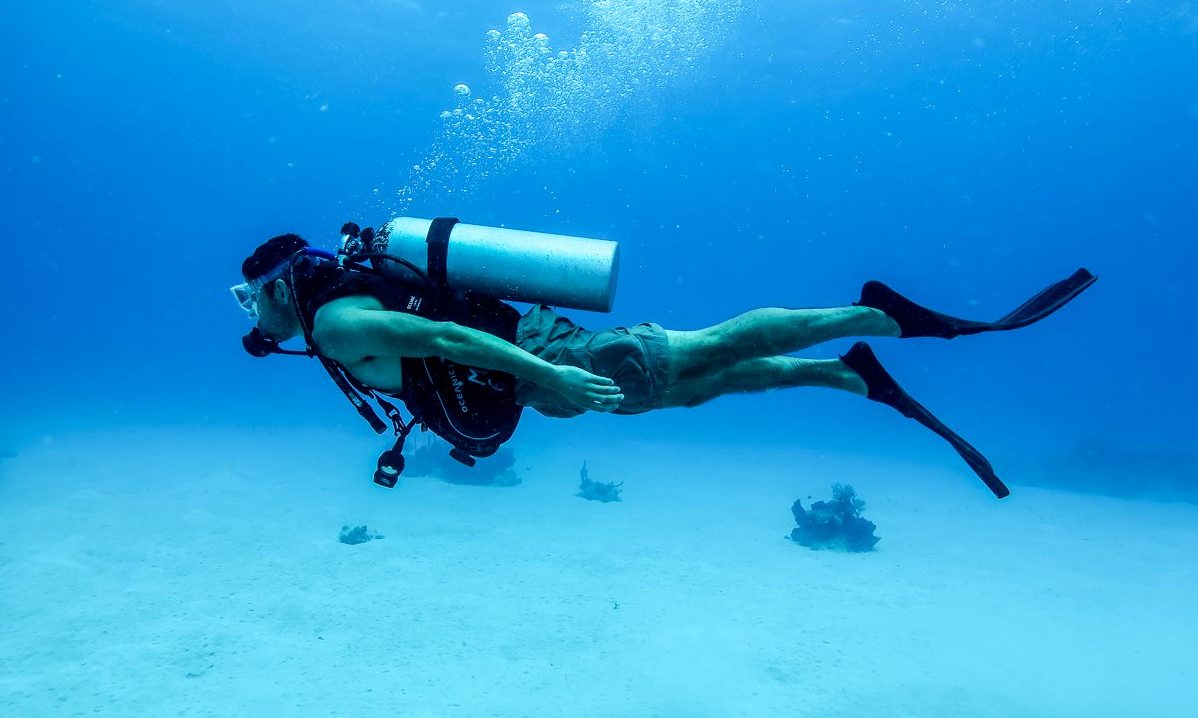
You have completed your diving course and you have booked your ticket to one of the premier destinations from a vacation packages brochure. You are so excited you cannot sit still, with thoughts of cruising through crystal blue waters, surrounded by brightly coloured tropical fishes, and possibly a sand shark or two.
But, you’re nervous. And, so you should be. Swimming under water, never mind breathing under water, is as natural to humans as walking on land is to a whale. We are not meant to be able to be one with our sea friends, yet, many do.
To ease your understandable worries, you need to be prepared. Your course has given you the basics, and you should repeat those rules over and over in your head, until they are part of you like breathing (above the water, that is).
But, we have a few tips for you that will have you entering the water with confidence and coming out the other side in one piece. Okay, that was a bad joke! No, really, you paid a lot of money to learn to scuba dive and get to that island holiday; so best you make the most of it.
- Equipment Savvy
You may have all the skill under the sun, but if your equipment fails you under the water, you will be in serious trouble. From your wetsuit to your tank, from your goggles to your flippers, you want to know that, when you’re 20 feet under, you can rely on your equipment. You don’t necessarily have to spend all your savings, but you also don’t want to be replacing gear over and over again. There is something to be said for quality when it comes to scuba diving equipment.
- Safety First
Much like a skydiver will check his equipment before blasting off out of the plane, so should you be doing the same before blasting into the water. Check for possibly-tearing belts, broken buckles, odd smelling air from your tank, if your air gauge is acting out in any weird way, and that you have enough air in your tank.
Besides your equipment safety, check the weather conditions, the sea conditions, and that you are feeling good yourself for a dive. Most diving accidents are because of bad weather conditions, and divers not paying attention to this. There are many online weather sites as well as apps that will give you a few days and even hours ahead as to what the sea and outside conditions will be up to.
If you are not feeling 100%, like you have a cold, are tired, or even if you have muscle aches from previous sport activities, it is best not to go out and dive, unless you are quite experienced. Rather spend the day relaxing in your comfortable manor house. As being under the water is unnatural for us humans, it is best to not put the body under too much extra strain.
- Never Dive Alone
No matter whether you have scoured the seas many a time, or you are a real newbie, it is always best to dive with at least 5 other divers, and to ensure that at least one of you have many dive hours behind you. If that’s you, great, but then prep your fellow divers, to make sure they are aware of the basic safety rules, as well as whether they are all in good shape. Diving with the locals from where your vacation packages deal got you, is always a good call. They will know the ins and outs of the terrain, where the sharks hide, and what areas are no-go’s.
- Communication is Key
As you are in a world where you cannot use your voice, it is ultimately important to learn to communicate in another way. And, that other way is via hand signals. There are very specific hand signals that divers are taught in the beginning, and some even go as far as learning deaf hand signals, so they can have more than a cursory conversation. They can talk about the sea life around them, as well as the vegetation.
Another way in which some divers chat to each other is via a slate board. If the visibility is good, then this can prove to be a great way to get your message across, especially if you are not good with hand signals, or are a real beginner.
Besides being able to communicate with your diving companions, you need to be constantly checking in on each other, and making sure that everything is okay. They will do the same with you. A simple thumbs-up can put their mind at rest, and then everyone can enjoy their dive.
- Keep Calm and Keep Diving
Again, as being under the water is a foreign habitat for us, it is very easy to get into a panic, and fast. The sight of a fin, or a black “something” passing across your visible periphery, can have you set into a flat spin.
And panic + water = disaster!
As you may be diving in close proximity to the others, there are chances you could kick their regulator out of their mouths, or sucker punch someone in the face or gut, simply because you panicked.
The most important part of feeling like you are going to lose it, is to focus in on your breathing. Never, ever, stop breathing. In fact, try to keep your breathing quite deep and slow, much like you would if you were having a panic attack outside of the water.
If you are in a situation where you feel less than comfortable, other than the obvious out-of-comfort-zone feel from being in the deep blue sea, then notify your dive master, or fellow divers. It is best to listen to your gut and end the dive there and then. There will always be other dives.
Scuba diving is a great sport and there are many magnificent dive sites around the world. Being fit and confident is an important factor to taking on the world of diving, so adhere to general water safety rules, and remember to have fun.



